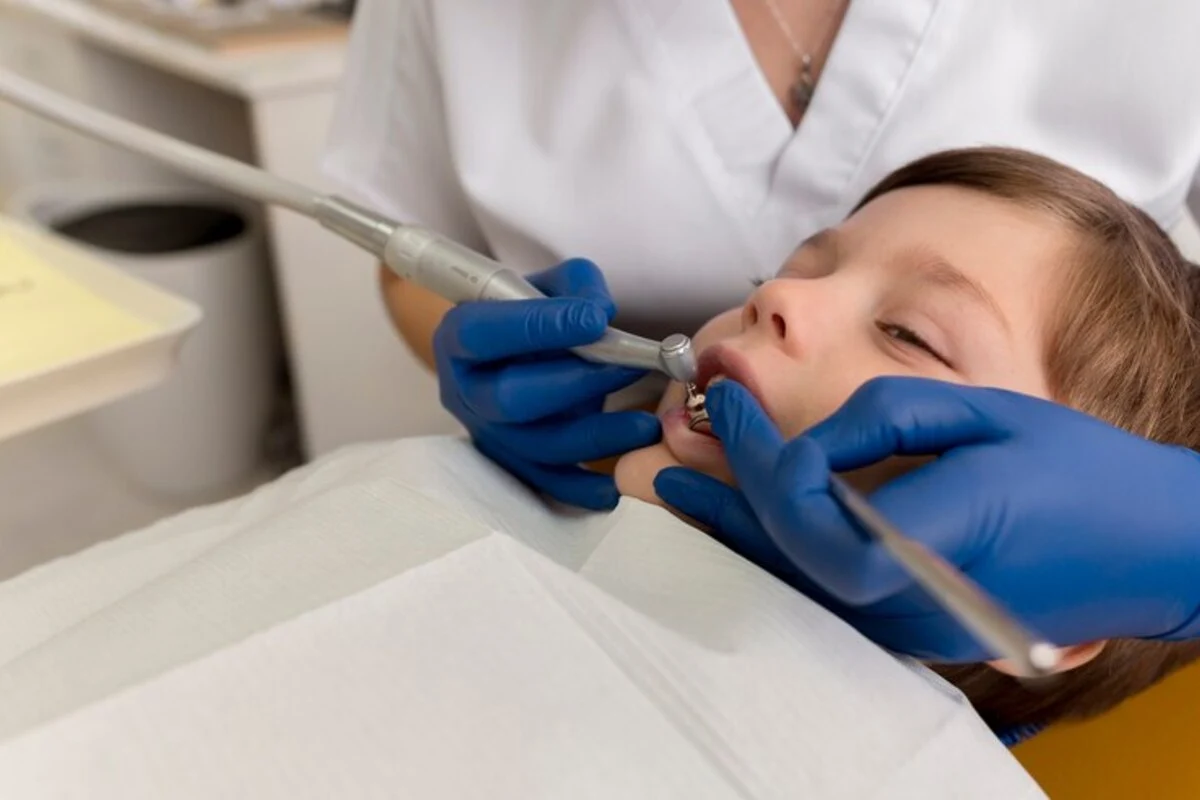Pediatric dentistry plays a crucial role in maintaining the oral health of children from infancy through the teenage years. It focuses not only on the treatment but also on the prevention of common dental issues, such as Early Childhood Caries (ECC), which is one of the most prevalent infectious diseases affecting children worldwide. In this article Fortune smiles dental care wants to give you special information related to this area.
Introduction to Pediatric Dentistry and Early Childhood Caries
Understanding the importance of pediatric dentistry and the impacts of ECC is essential for parents and guardians to ensure the health and well-being of their children’s dental and overall health.
What is Pediatric Dentistry?
Pediatric dentistry is a specialty that provides both primary and comprehensive preventive and therapeutic oral health care for infants and children through adolescence, including those with special health care needs. Pediatric dentists are trained to handle a range of issues associated with children’s oral health.
Read it: Advances in Dental Implant Techniques
They work on developing trust and confidence in children with their dentist, teaching parents and children effective dental hygiene practices, and managing oral health changes throughout the various stages of childhood.
Understanding Early Childhood Caries (ECC)
Early Childhood Caries (ECC) is a serious public health problem in both developing and industrialized countries. ECC is characterized by the presence of one or more decayed, missing, or filled tooth surfaces in any primary tooth in a child 71 months of age or younger. If left untreated, ECC can lead to pain, infection, and difficulties in chewing, speaking, and sleeping.
Impact of ECC on Children’s Health
The implications of ECC extend beyond just dental health. ECC can affect a child’s nutrition, speech development, and self-esteem. Children suffering from ECC may experience pain and discomfort, which can lead to difficulties in eating, potentially affecting their nutritional intake and overall health.
Moreover, ECC can have psychological effects, as children with noticeably decayed teeth may feel self-conscious and may be subject to teasing by peers.
Preventing ECC Through Pediatric Dentistry
Prevention is a key component of pediatric dentistry. Regular dental check-ups from a young age help to establish the foundations of good oral hygiene and healthy habits that will last a lifetime.
Pediatric dentists provide parents with detailed information on common risk factors for ECC, such as poor feeding habits, inadequate oral hygiene, and genetic predisposition. They also offer advice on preventive measures including proper toothbrushing techniques, the importance of fluoride, and healthy diet choices that minimize sugar intake.
Role of Pediatric Dentists
Pediatric dentists are skilled in providing care tailored to meet the needs of children. They use specially designed equipment in offices that are arranged and decorated with children in mind. Their specialized training and focus on preventative care make them proficient at handling the unique dental needs of infants, children, and adolescents, ensuring a positive dental experience.
In conclusion, the field of pediatric dentistry is vital not only for treating and managing oral health diseases like ECC but also for preventing them. Its focus on early prevention and educational outreach to families sets the stage for a lifetime of excellent oral health and overall well-being.
By understanding the critical role of pediatric dentists and the significant impact of ECC, parents can take proactive steps to ensure their children’s health, starting with the very first tooth.
Risk Factors and Prevention of Early Childhood Caries
Early Childhood Caries (ECC) is not only a common dental problem among young children but also a preventable one.
Read it: Latest Advances in Dental Bridges
Recognizing the risk factors associated with ECC and implementing effective prevention strategies are essential steps in ensuring the oral health of children. This section delves into the various risk factors for ECC and provides comprehensive guidance on how to prevent this prevalent condition.

Understanding Risk Factors for ECC
The development of ECC can be influenced by a multitude of factors, ranging from biological and behavioral to social and environmental. Awareness of these risk factors is the first step in preventing ECC.
- Dietary Habits: High frequency of sugary or starchy food and beverage intake is one of the primary risk factors for ECC. When children frequently consume these types of foods, they provide a constant food source for the bacteria in the mouth that produce harmful acids.
- Poor Oral Hygiene: Inadequate brushing and flossing allow plaque to build up, facilitating the growth of bacteria that cause tooth decay. Young children are especially vulnerable because their brushing skills are typically underdeveloped.
- Bottle Feeding at Night: Putting a child to bed with a bottle of milk, formula, or juice can lead to prolonged exposure to sugars, which supports the growth of decay-causing bacteria.
- Transmission of Bacteria: ECC can also be influenced by the transmission of caries-producing bacteria from mothers (or primary caregivers) to children, through sharing spoons, cleaning pacifiers in their mouth, or other forms of close contact.
- Socioeconomic Factors: Children from families with lower socioeconomic status often have higher rates of ECC due to factors such as limited access to dental care, lack of awareness about dental hygiene, and nutritional choices.
- Genetic Susceptibility: Some children may be more prone to developing caries because of genetic variations that affect the composition of their saliva or the structural integrity of their teeth.
Preventive Measures Against ECC
Preventing ECC involves a multifaceted approach that includes dietary management, proper oral hygiene practices, and regular dental visits.
Read it: The Synergy of Biomimetic and Holistic Approaches in Dentistry
- Diet Management: Limiting sugary snacks and drinks is crucial in preventing tooth decay. Encourage healthy eating practices by offering nutritious snacks such as vegetables, fruits, and cheese, which are better for teeth and overall health.
- Fluoride Use: Fluoride strengthens the enamel and makes it more resistant to acid attacks. Use toothpaste with an appropriate fluoride level for children, and consult with a pediatric dentist about the need for additional fluoride treatments.
- Proper Oral Hygiene: Teach children to brush their teeth at least twice a day with fluoride toothpaste and to floss daily. Supervise young children’s brushing to ensure that they use the correct techniques and do not swallow toothpaste.
- Regular Dental Check-ups: Schedule regular dental check-ups from the child’s first birthday. These visits not only allow for the professional cleaning of the child’s teeth but also enable the dentist to catch and treat any early signs of decay before they develop into serious problems.
- Parental Education: Educating parents and caregivers about the causes and risks of ECC is fundamental. Pediatric dentists often provide educational resources that help families establish healthy oral care routines.
- Avoidance of Bottle Feeding at Bedtime: Educate parents about the risks of putting a child to bed with a bottle containing anything other than water.
Community and Public Health Initiatives
In addition to individual actions, community health initiatives play a vital role in preventing ECC. Programs that provide fluoridated water, community dental health campaigns, and school-based dental screenings can help reduce the prevalence of ECC among broader populations.
Read it: Biomimetic Materials Transform Dental Restoration
In conclusion, preventing Early Childhood Caries requires an integrated approach that combines personal care, educational efforts, and community health initiatives. By understanding and addressing the risk factors, parents and caregivers can take significant steps toward preventing ECC and ensuring that children grow up with healthy, strong teeth.
This proactive approach not only enhances the oral health of children but also contributes to their overall health and well-being as they develop.
Treatment Options for Early Childhood Caries
When prevention measures are not enough to avoid Early Childhood Caries (ECC), it becomes crucial to explore effective treatment options. Treating ECC promptly is essential to prevent the progression of decay, which can lead to pain, infection, and potential problems with developing permanent teeth.

This section outlines the various treatment modalities available for managing ECC, tailored to the severity of the condition and the specific needs of the child.
Assessment and Early Intervention
The initial step in treating ECC is a thorough dental examination to assess the extent of decay and the overall oral health of the child. This assessment helps in planning the appropriate treatment strategy, which may include one or several of the following options:
Read it: Transforming Smiles with Dental Veneers: Everything You Need to Know
- Fluoride Therapy: Early signs of dental caries can sometimes be reversed with fluoride. Fluoride varnish can be applied to the teeth to help remineralize areas of early decay and prevent further deterioration.
- Dental Sealants: Sealants can be applied to the chewing surfaces of back teeth where decay occurs most often. This preventive treatment consists of applying a protective plastic coating that seals the grooves and fissures in the teeth, shielding them from bacteria and acids.
- Composite Fillings: For teeth where caries has progressed beyond the initial stage, composite fillings are used to restore function and aesthetics. These tooth-colored fillings are preferred in pediatric dentistry because they require less removal of tooth structure compared to traditional fillings and blend seamlessly with natural teeth.
- Pulp Therapy: In cases where decay has reached the pulp (nerve and blood vessels) of the tooth, pulp therapy may be necessary. This treatment, also known as a pulpotomy or pulpectomy, involves removing the diseased pulp tissue to preserve the remaining healthy tooth structure and prevent the spread of infection.
- Stainless Steel Crowns: When a large portion of the tooth is affected by decay, a stainless steel crown may be recommended. These crowns provide durable coverage and are commonly used in pediatric dentistry to restore primary (baby) teeth that have been compromised by caries or are at high risk of decay.
Behavioral Management During Treatment
Treating young children requires special considerations to ensure they remain calm and cooperative during dental procedures. Pediatric dentists are skilled in behavioral management techniques such as:
- Tell-Show-Do: The dentist explains and demonstrates the procedure in a child-friendly manner before carrying it out to familiarize the child with what to expect.
- Positive Reinforcement: Praising the child for cooperative behavior during dental visits encourages them and helps reduce anxiety.
- Parental Involvement: Having a parent present during treatment can provide comfort and reassurance to the child, making the process smoother and less stressful.
Read it: The Rise of Minimally Invasive Dentistry: A Closer Look at Its Growing Importance
Sedation and General Anesthesia
In certain cases, where the child is extremely anxious, uncooperative, or the treatment is extensive, sedation or general anesthesia may be considered to ensure that the procedure can be performed safely and without causing trauma to the child. These options are carefully evaluated based on the child’s health, age, and specific dental needs.
Post-Treatment Care and Follow-up
After ECC treatment, establishing an effective dental care routine is crucial to prevent recurrence. Pediatric dentists provide comprehensive guidance on post-treatment care, which includes:
- Regular Oral Hygiene: Reinforcing the importance of regular brushing and flossing to maintain the health of treated and untreated teeth.
- Dietary Recommendations: Advising on nutritious, low-sugar diets to support dental health and overall well-being.
- Regular Dental Visits: Scheduling regular follow-ups to monitor the child’s oral health and ensure that the teeth are developing correctly.
In conclusion, various treatment options are available for managing Early Childhood Caries, each tailored to the specific needs of the child and the severity of the condition. Prompt and effective treatment is essential not only to alleviate immediate symptoms but also to prevent long-term complications and ensure the development of healthy permanent teeth. Pediatric dentists play a crucial role in providing these treatments while ensuring the comfort and safety of the child throughout the dental care process.
The Long-Term Impact of Early Dental Care on Overall Health
Addressing Early Childhood Caries (ECC) and establishing a foundation of good oral hygiene from a young age have profound long-term benefits on a child’s overall health and well-being. This final section discusses the far-reaching impacts of early dental care, emphasizing how preventive measures and early treatment of dental issues can influence various aspects of a child’s life.
Read it: Biomimetic Techniques in Dental Inlays: The Future of Dentistry
Oral Health and Its Connection to General Health
The state of a child’s oral health can significantly influence their general health and development. ECC, for example, is not only a painful condition that affects a child’s ability to eat, speak, and sleep but also has potential links to more serious health issues.
Research has shown that poor oral health can lead to increased risks of developing heart disease, diabetes, and respiratory ailments later in life. Additionally, the chronic inflammation associated with severe dental caries can contribute to broader systemic issues.
Impact on Developmental Milestones
Early dental care influences key developmental milestones in children. Pain and discomfort from untreated caries can hinder a child’s ability to concentrate and participate in school, affecting academic performance and social interactions.
Moreover, children with poor oral health are often more likely to miss school and receive lower grades compared to their peers. By ensuring proper dental care, children are more likely to participate fully in educational opportunities and engage in social activities without the hindrance of oral discomfort.
Psychological and Emotional Well-being
The aesthetics of one’s teeth can significantly impact self-esteem and confidence, especially in children. Early loss of teeth due to ECC or visible decay can affect a child’s self-image and how they interact with peers, potentially leading to social withdrawal and emotional distress. Early intervention helps maintain not only the health but also the appearance of teeth, thereby supporting a child’s overall emotional and social development.
Preventive Care as a Cost-Effective Solution
Investing in early dental care is also economically advantageous. Preventive care, such as regular check-ups, cleanings, and the application of sealants, is less expensive than the cost of treating dental conditions that have been allowed to progress. Early treatment of ECC can prevent the need for more extensive and costly procedures like root canals, crowns, or even tooth extractions later on.
Moreover, instilling good oral hygiene habits from a young age reduces the likelihood of dental issues persisting into adulthood, potentially saving significant amounts on future dental treatments.
Parental and Community Education
Educating parents, caregivers, and communities about the importance of early dental care and ECC prevention is critical. Effective education can lead to improved oral hygiene practices at home, better dietary choices, and increased regularity of dental visits for children.
Read it: Introduction to Clear Aligner: What It Is and How It Works
Community health programs and school-based initiatives can play a pivotal role in disseminating this knowledge, especially in underserved areas where awareness and access to dental care may be limited.
Building a Foundation for Lifelong Health
Ultimately, the goal of pediatric dentistry is to establish a foundation for lifelong health. Regular dental care encourages the maintenance of good oral hygiene habits that children carry into adulthood. Moreover, understanding the importance of oral health in the context of general health empowers children to take charge of their health beyond just their teeth, fostering a holistic approach to health and wellness from an early age.
In conclusion, the benefits of early dental care extend far beyond preventing and treating ECC. They influence a child’s health, developmental trajectory, psychological well-being, and economic outcomes throughout their life.
By prioritizing early dental care, we can ensure that children grow up with not only healthier smiles but also healthier futures. This commitment to pediatric dental care is a vital investment in the overall health and potential of the next generation.

